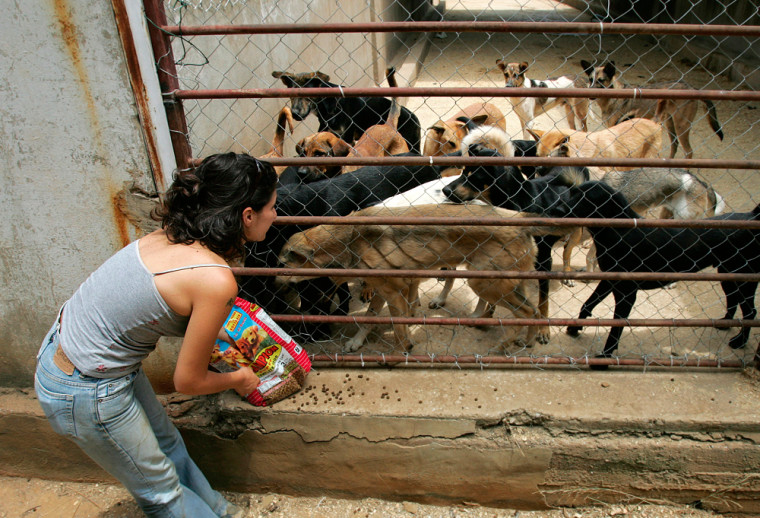The howls of 133 canine refugees echoed Tuesday through the pine-and-oak-covered hills above the Lebanese capital — crowded into cages but safely away from airstrikes against Hezbollah strongholds in the south.
The dogs were moved by volunteers from a shelter in Beirut’s southern suburbs to an abandoned pig farm east of the capital — and might be considered lucky compared to pets left to fend for themselves by foreign and Lebanese owners fleeing the Israeli bombardment.
The U.S. Embassy and others told evacuees that pets would not be allowed on the ships and helicopters carrying them to safety.
“The embassies that evacuated their citizens from Lebanon made a mistake when they made no provisions for pets,” activist Hania Jurdak said.
The group spearheading efforts to save the animals is BETA, Lebanon’s first animal welfare and rescue organization, established two years ago. The group rescues stray and abused animals and tries to find them homes.
On Saturday, BETA — which stands for Beirut for the Ethical Treatment of Animals — made an appeal for donations on its Web site “to get the animals through this period.”
In Israel, volunteers were also trying to save animals abandoned by owners fleeing their homes in the north to escape Hezbollah rocket attacks.
Thousands roam the streets
“We took in about 200 animals, mainly dogs and cats,” said Tamara More, general manager of the rescue organization Ahava.
She said volunteers were going into northern towns and cities to feed abandoned animals. There “are thousands of dogs and cats roaming the streets without anyone to care for them,” More said.
At the start of the hostilities July 12, BETA had 113 dogs and about 100 cats at the shelter near a Hezbollah stronghold in Beirut.
The dogs were moved to the hilltop farm in Monteverde, about 10 miles east of the capital, because they were traumatized by the shelling, said BETA co-founder Joelle el-Massih.
“They were stressed out and were suffering from diarrhea,” said el-Massih. “We worried they would be hit.”
Volunteers took the strays to the farm last week in minibuses or cars. El-Massih said the owner has put the farm at BETA’s disposal until the violence ends.
Farm space into clinics
Workers were busy Tuesday converting two rooms on the farm into clinics and the group plans to build play areas for the dogs.
The cats have been moved to a safer Beirut neighborhood, el-Massih said.
Animal rights activists have received scores of calls from Lebanese and foreigners asking what to do with their pets when they evacuate.
El-Massih said she refers callers to commercial kennels because the BETA shelter is overcrowded, but activists have told her that “many people are just leaving their dogs in the street.”
“We will go look for them as soon as the new shelter is ready,” el-Massih said.
Hani Rayess said he has taken in about 45 dogs. He charges their owners $100 a month.
“Some owners asked me to meet them as they headed to their ships,” said Rayess. “A couple of Westerners told me they would not leave Lebanon because they had nowhere to place their pets.”
One call came from a U.N. worker who was headed to a ship in the southern port city of Tyre, said BETA president Ali Hamadeh. Hamadeh said the U.N. worker felt guilty because in her rush to go, she left her cat Raja locked in her home. She pleaded with Hamadeh to save the cat.
Hamadeh, a veterinarian in Beirut, said the first driver he called refused to go because the road was too dangerous. Israel has been pounding the area relentlessly during the past two weeks.
The driver called several colleagues before he found one willing to make the drive.
“The cat is happy and he is with me at the clinic,” Hamadeh said.
More, the Israeli animal rescuer, said her group had contacted BETA to offer assistance in evacuating animals, “but they are not interested in being in touch with us.”
“We don’t understand why people are willing to sacrifice the lives of the dogs and the cats just not to speak with the people of Israel,” More said.
She said Ahava has proposed meeting fleeing Lebanese in boats in international waters to collect their pets.
Embassies can't be bothered
The “embassies quite frankly told us they are not going to bother themselves with the plight of animals, they are only concerned with people,” More said. “Believe me, dogs and cats in Lebanon don’t see themselves as political animals. They just want to leave.”
El-Massih said BETA was never contacted by the Israeli animal rights group, although it did receive a sympathy e-mail from a former member of Ahava who now lives in the United States.
BETA volunteer Helena Hesayne said the shelter has received e-mails from the United States, Canada and Europe asking about taking in some of the dogs. But that is impossible for now, while Lebanon remains under Israeli siege.
Mixed breeds Russia and Candy had been scheduled to leave Lebanon for Germany shortly after the fighting started, while Blackie was supposed to head for Canada around the same time.
On Tuesday, they were barking in their cages on a hilltop in Monteverde after it became impossible to fly out of the country.
